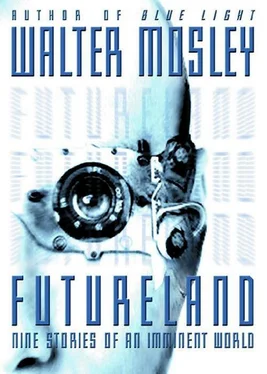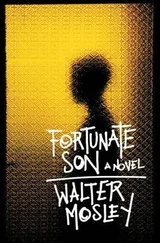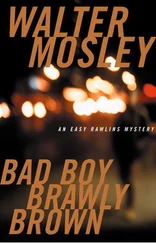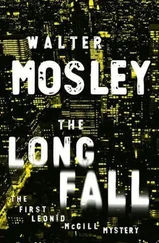When Leon took the hedroprofin the voice disappeared. He was happy not to feel that he was going crazy, but he discovered that he missed the voice. It had been an anchor after years of Pulse addiction. With no obsession left he found himself drifting.
His daughter was in D.C. testing the waters for a greater political career. As a onetime drug addict, he was an embarrassment to her. The newspapers that backed Fera Jones’s political ambitions blamed the elder Jones for forcing his daughter into the ring to pay for his drugs. It wasn’t true. As a child Fera had begged to fight. She was overactive, and boxing was the one thing that calmed her down.
They talked every day for a few minutes. But she was busy and he had nothing but time.
Professor Jones lived in two small rooms on Middle One twenty-fifth Street near Adam Clayton Powell. When he was a child Harlem was an entirely black neighborhood, one of the centers of African-American culture. But now it was as faceless and multicultured as any other neighborhood in Manhattan. The Schomburg Residence Hotel was happy to take a congresswoman’s father for a tenant. The rent was $2,000 a week, 60 percent of his disability insurance.
He read and reread books about history. Not histories, but books that spoke of the art of recording the past. Colling-wood and Hegel and Ahn Min. That’s what intrigued Jones: the intangibility of what was. The passage of time and the forgetfulness of humanity. Even his talk with the unsightly Dr. Bel-Nan. Did he say that the cells of the donor remembered details from the previous life? No, not exactly. He hadn’t exactly said anything.
“The best history is a shopping list,” one of his professors at Howard had said. “Three bananas, two lengths of copper wire, and a broad-brimmed hat. Now that’s something to sink your teeth into.”
Bel-Nan wasn’t even his real name. He’d changed it hoping, like the rulers of a new dynasty in China who rewrote history, to be seen in a new light. From many years of study Jones had decided that nothing anyone ever said was true; at best it was what they believed.
On a temperate December morning Professor Jones decided to go down to Morningside Park, a green valley between towering buildings. In his childhood his Aunt Bing would tell him that the park was a dangerous place where drug dealers and gang members met. And so when his Uncle Bly took the short cut through the park little Leon would turn his head every which way to see where the killers were hiding.
“It’s okay in the daytime,” Bly would assure him.
But Leon never stopped his vigil until they were back on the regular streets, safe from harm.
“Mister?” a child’s voice asked.
At first he thought it was the voice in his head. The question was not a lament, however. Professor Jones looked down and saw a blond-haired child, no more than five, standing at the far end of the park bench.
He blinked once, expecting the child to disappear.
“Are you cold, mister?” the girl asked instead of dissipating.
“No. Why do you ask?”
“I’m cold,” she said.
Leon had worn a corduroy jacket over a plaid woolen shirt. He also had a cashmere scarf that Fera had given him wrapped around his neck. The scarf was making him too warm but he hadn’t thought to take it off yet.
“Here,” he said. “Try this.”
The little girl threw the wrap around her shoulders with the grace of a somewhat older child. She shivered and then smiled.
“Thanks,” she said.
“All warm now?”
“Pretty much,” she said. “Can I sit here until my mommy comes back?”
“Where is your mother?” Leon asked as he lifted the child to sit there next to him.
“She’s up over there talking to Bill,” the girl said, pointing down a path that turned away and disappeared into the trees.
“What are they talking about?”
“How come you looked scared when you saw me?” the girl asked.
“Did I?”
“It’s not polite to answer with a question,” the girl said primly, gesturing her hands like a traffic cop or maybe a music conductor.
“I asked the first question,” Leon said, also gesturing. “And then you asked about why was I scared.”
“But I wasn’t answering your question,” the girl giggled. “I was changing the subject.”
“Oh you were, were you?” Leon had the urge to reach out and tickle the child, but he didn’t. He didn’t know her. He could go to jail for twenty years for child molesting. But she was so darling, like Fera had been. She didn’t look anything like Fera, but she had the same silly spunk.
“I was surprised,” he said, “because when I was a boy and lived here there were no little white girls in Harlem.”
“Am I a white girl?”
The question stunned Leon. He didn’t know what to answer.
“Your hair is almost white,” he said lamely.
“But you didn’t mean my hair, huh?” the girl said. “You meant my skin.”
“Yeah. I guess so.”
“And if I’m white then what are you?”
“Black,” Leon said instantly.
“But your skin is just brown,” the girl said. “And my skin has some brown and some pink and some yellow, too.” She rubbed her arm and peered at the skin as she did so.
“I think we’re all the same color, just more of some colors and not so many of others.” She held out her arm and looked at Leon as if to get his opinion on her theory.
Leon suppressed the urge to hug the child. He clasped his hands and pressed them against his lips.
There came a gurgling cry. Leon jerked his head around to look up the path where the child’s mother was talking to someone named Bill.
“Coming, Mom!” the child yelled. She was running up the path, toward the cry.
Leon was exhausted by the long walk from his apartment to the park. He struggled to his feet and went up the pathway, but the girl had already disappeared.
When he got to the playground on the other side of the park the girl was gone. Children capered while their mothers or nannies watched, but there was no one who looked like the child’s mother talking to anyone who looked like a Bill.
No one seemed worried about a gurgling cry.
“I met this little girl in the park today, Fifi,” Leon was saying to his daughter on the vid that evening. She was at her office, poring over a blue and red pie chart on a wall-mounted computer screen.
“A child?” she asked, turning momentarily from the graph.
“Just a little girl. Her mother left her alone and she wasn’t dressed warmly enough. I let her have that scarf you gave me last Easter.”
“You gave a strange child in the park your scarf?” Fera gave the vid screen her full attention now.
Cosmetic surgery had completely fixed her broken nose and the permanent swell that had developed over her right eye. Her golden skin nearly shone in the fluorescent lighting. At twenty-five she was ravishing if a bit imposing at six-nine and two hundred plus pounds.
“She was cold,” Leon said in a glad tone. “Smart little kid, too. Reminded me of you.”
“What’s the child’s name, Daddy?”
He could hear the concern in her voice.
“I didn’t get it. Her mother called and she ran away. I went after to make sure she was all right, but you know I’m so tired after the operations.”
“Why did you need to see if she was all right?” Fera asked. “Oh, it was nothing. Just the tone in her mother’s voice.”
“What tone?”
“It sounded more like she was screaming than calling, that’s what I thought, but when I got to the playground they were gone.” When Leon Jones grinned and nodded his head, he realized, for the first time, that he’d become an old man.
Читать дальше












